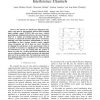1087 search results - page 173 / 218 » Generation under Space Constraints |
ECAI
2010
Springer
13 years 9 months ago
2010
Springer
The language of linear temporal logic (LTL) has been proposed as a formalism for specifying temporally extended goals and search control constraints in planning. However, the seman...
ICDE
2006
IEEE
15 years 10 days ago
2006
IEEE
Wireless sensor networks generate a vast amount of data. This data, however, must be sparingly extracted to conserve energy, usually the most precious resource in battery-powered ...
NDSS
2008
IEEE
14 years 5 months ago
2008
IEEE
Third Generation (3G) cellular networks utilize timevarying and location-dependent channel conditions to provide broadband services. They employ opportunistic scheduling to effic...
PIMRC
2008
IEEE
14 years 5 months ago
2008
IEEE
Abstract—We present two interference alignment techniques such that an opportunistic point-to-point multiple input multiple output (MIMO) link can reuse, without generating any a...
VTC
2007
IEEE
14 years 5 months ago
2007
IEEE
— Current UWB systems apply convolutional codes as their channel coding scheme. For next generation systems LDPC codes are in discussion due to their outstanding communications p...

